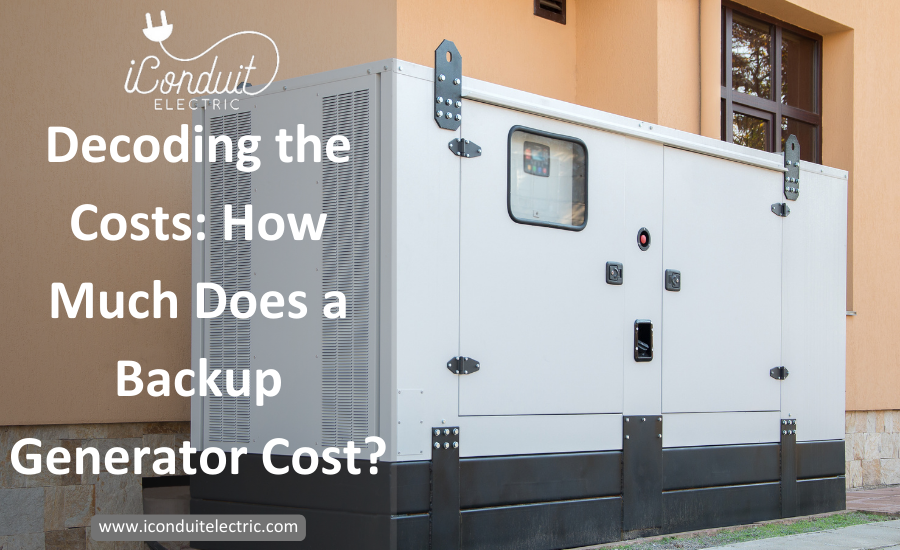Backup Generator Cost: What to Expect When Investing in Backup Power
Chicago, United States - December 1, 2023 / iConduit Electric /
Homeowners often wonder, "How much does a backup generator cost?", especially when facing frequent power outages or preparing for unpredictable events. The answer, however, is not straightforward. Several factors influence the cost of backup generators, ranging from size and power output to installation complexities. iConduit Electric delves deep into these factors to give homeowners a clearer picture of potential expenses and the reasons behind them.
Size and Power Output
The most basic cost determinant is a generator's size and power output. Backup generators come in a myriad of sizes to cater to different needs:
- Small, Portable Generators: These are ideal for running essentials like refrigerators, fans, and lights. They usually range from 2,000 to 7,000 watts and are less expensive. Their portability makes them versatile, though they might not support an entire household.
- Mid-Size Standby Generators: With power outputs ranging from 8,000 to 20,000 watts, these can comfortably support a medium-sized home, ensuring most appliances run seamlessly during an outage. They come with a higher price tag but offer greater convenience and coverage.
- Large Standby Generators: For larger homes or those with critical power needs, generators with 20,000 watts or more are ideal. They guarantee comprehensive coverage but are the most expensive.
Fuel Type
The choice of fuel can also sway the initial cost and ongoing expenses:
- Gasoline: While gasoline generators are generally cheaper to buy, they have higher running costs due to the volatile prices of gasoline. They also require frequent refueling during extended outages.
- Diesel: Diesel engines are known for their longevity and efficiency. Though diesel generators might be more expensive initially, they tend to have lower operational costs.
- Natural Gas and Propane: These fuel types are cleaner and, in some areas, cheaper. Generators running on natural gas or propane might be priced mid-range but offer a balance between initial expenses and running costs.
- Solar-Powered Generators: Solar backup generators have gained popularity with increased emphasis on sustainability. While their upfront cost can be substantial, the ongoing costs are minimal.
Installation Complexities
The location and complexity of the installation can significantly impact the overall cost. Professional installation might include site preparation, electrical wiring, and potential home modifications. It's essential to factor these into the total cost of acquiring a backup generator.
Brand and Features
Like any other product, brand reputation and additional features can influence the price. Top-tier brands known for reliability and advanced features like remote monitoring or automated transfer switches will likely command a higher price.
Several brands are renowned for producing high-quality home generators. Here's a list of some of the most reputable ones:
Generac: Often considered one of the top brands in the home generator market, Generac offers a wide range of sizes and models to fit various needs.
Briggs & Stratton: With a long-standing reputation in the engine industry, Briggs & Stratton provides reliable and durable generators for home use.
Kohler: Known for their high-quality products, Kohler generators are often used in residential and commercial settings.
Cummins: While they're perhaps best known for their diesel engines, Cummins also manufactures a line of dependable home generators.
Westinghouse: An established brand in the electrical industry, Westinghouse offers a variety of efficient and reliable generators.
Champion: With a reputation for durability, Champion generators are popular among homeowners looking for long-lasting backup power solutions.
Yamaha: While they're more well-known for portable generators, Yamaha's products are recognized for their reliability and build quality.
Honda: Honda's generators are known for their quiet operation and reliability, making them a favorite for home backup and recreational use.
CAT (Caterpillar): Primarily known for heavy machinery, CAT also offers a line of robust and reliable generators suitable for various applications, including home backup.
DuroMax: Offering a range of both gasoline and dual-fuel generators, DuroMax has become a popular choice for homeowners due to its versatility and reliability.
Maintenance and Warranty
Maintenance is an ongoing cost that affects the total expenditure over the generator's lifespan. Some generators require frequent maintenance, while others have longer service intervals. Furthermore, a robust warranty can save money in the long run, even if it means paying more upfront.
The Benefits Can Outweigh The Costs
Understanding the factors that answer the question, "How much does a backup generator cost?" empowers homeowners to make informed decisions. While the initial price is an essential consideration, weighing it against potential long-term benefits and convenience is crucial.
If there's uncertainty about what type of generator best suits a specific need or how to factor in all the associated costs, it's always advisable to seek expert guidance. For homeowners looking deeper into backup power solutions, iConduit Electric is the ideal partner to illuminate the path. Don't stay in the dark; contact iConduit Electric today for a personalized estimate for backup power needs.

Contact Information:
iConduit Electric
7332 W Myrtle Ave
Chicago, IL 60631
United States
Nick Braun
(708) 831-5136
https://iconduitelectric.com/
Original Source: https://iconduitelectric.com/backup-generator-costs/


